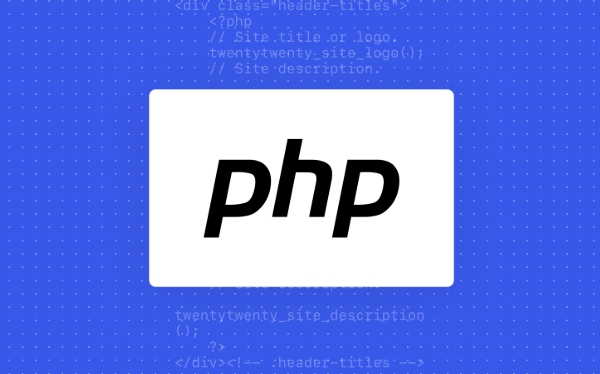 Backend Development
Backend Development
 PHP Tutorial
PHP Tutorial
 From Functions to Closures to Methods: A Holistic View of PHP Scope
From Functions to Closures to Methods: A Holistic View of PHP Scope
From Functions to Closures to Methods: A Holistic View of PHP Scope
Jul 30, 2025 am 05:35 AMFunctions have isolated scope and require global or $GLOBALS to access global variables; 2. Closures capture outer variables explicitly via use, by value or by reference using &; 3. Methods use $this to access object properties, and closures inside methods can inherit $this in PHP 5.4 , but using use ($this) ensures clarity and safety when passing closures. Understanding these scope rules enables predictable and maintainable PHP code.

When learning PHP, one of the trickiest concepts to grasp isn't syntax—it's scope: understanding where variables and functions live, how they’re accessed, and how context changes everything. Whether you're calling a simple function, using a closure, or invoking a method on an object, the rules of scope shift subtly but significantly. Let’s walk through these three constructs—functions, closures, and methods—and see how PHP handles scope in each, building a cohesive mental model.

Function Scope: The Basics
In a regular PHP function, variables declared inside are local by default. They don’t inherit variables from the outer (global) scope unless explicitly told to.
$color = 'blue';
function paint() {
echo $color; // Notice: Undefined variable
}
paint();To access global variables, you need the global keyword:

function paint() {
global $color;
echo $color; // 'blue'
}Alternatively, you can use $GLOBALS superglobal:
function paint() {
echo $GLOBALS['color']; // 'blue'
}Key point: Functions have their own isolated scope. No automatic access to outer variables.

Closures and use: Capturing Scope
Closures (anonymous functions) are more flexible. They can capture variables from the parent scope using the use keyword.
$color = 'red';
$painter = function() use ($color) {
echo $color; // 'red'
};
$painter();Here, $color is copied by value into the closure. Even if you change $color later, the closure keeps the original value:
$color = 'green';
$painter = function() use ($color) {
echo $color;
};
$color = 'yellow'; // change after defining closure
$painter(); // still prints 'green'Want to reference the variable instead? Use &:
$color = 'green';
$painter = function() use (&$color) {
echo $color;
};
$color = 'purple';
$painter(); // 'purple'Now the closure sees the current value because it holds a reference.
Key insight: Closures let you import outer variables explicitly, either by value or by reference—no guessing, no globals.
Methods and $this: Object Scope
When you move into classes, scope gets another layer: the object instance. Inside a method, you’re in the object’s scope, and $this gives you access to its properties and methods.
class Car {
private $color = 'silver';
public function drive() {
echo "Driving the {$this->color} car.";
}
}Unlike functions or closures, methods don’t need use or global to access instance data—they’re naturally bound to $this.
But what if you use a closure inside a method? Does it automatically know $this?
class Car {
private $color = 'blue';
public function getColorFetcher() {
return function() {
return $this->color; // Fatal error: Using $this outside object context
};
}
}Oops! Even though the closure is defined inside a method, it doesn’t automatically inherit $this. However, as of PHP 5.4, anonymous functions created in an object context do capture $this if used.
So this actually works:
$fetcher = (new Car())->getColorFetcher(); echo $fetcher(); // 'blue' — works in PHP 5.4
But if you were to bind the closure to another object (or none), $this could change or disappear.
To be safe or explicit, you can use use:
public function getColorFetcher() {
$self = $this;
return function() use ($self) {
return $self->color;
};
}This pattern is useful when passing closures to functions that might change context.
Scope Summary: The Big Picture
| Construct | Scope Access | Key Mechanism |
|---|---|---|
| Function | Isolated |
global, $GLOBALS
|
| Closure | Captured |
use ($var) or use (&$var)
|
| Method | Object |
$this for instance data |
| Closure in Method | Depends | Inherits $this if supported, but can use use for safety |
A few practical takeaways:
-
Avoid
globalwhen possible—it makes code harder to test and reason about. -
Use
usethoughtfully in closures—know whether you need a copy or a reference. -
Be cautious with
$thisin closures—especially if the closure might be passed around or called outside the original object context. -
In modern PHP, closures in methods usually work fine with
$this, but explicituse ($this)can make intent clearer.
Final Thought
PHP’s scope rules might seem fragmented at first—functions isolated, closures selective, methods tied to objects—but they make sense when you see them as tools for controlling access. Each construct gives you just enough power to connect scopes when needed, without leaking them by default.
Understanding how and why scope changes between functions, closures, and methods isn’t just academic—it’s the key to writing predictable, maintainable PHP.
Basically, it’s not magic. It’s design.
The above is the detailed content of From Functions to Closures to Methods: A Holistic View of PHP Scope. For more information, please follow other related articles on the PHP Chinese website!

Hot AI Tools

Undress AI Tool
Undress images for free

Undresser.AI Undress
AI-powered app for creating realistic nude photos

AI Clothes Remover
Online AI tool for removing clothes from photos.

Clothoff.io
AI clothes remover

Video Face Swap
Swap faces in any video effortlessly with our completely free AI face swap tool!

Hot Article

Hot Tools

Notepad++7.3.1
Easy-to-use and free code editor

SublimeText3 Chinese version
Chinese version, very easy to use

Zend Studio 13.0.1
Powerful PHP integrated development environment

Dreamweaver CS6
Visual web development tools

SublimeText3 Mac version
God-level code editing software (SublimeText3)

Hot Topics
 The Omnipresent Scope: A Practical Guide to PHP's Superglobals
Jul 26, 2025 am 09:47 AM
The Omnipresent Scope: A Practical Guide to PHP's Superglobals
Jul 26, 2025 am 09:47 AM
PHP's hyperglobal variables are always available built-in arrays used to process request data, manage state and obtain server information; 1. When using $_GET, URL parameters need to be type-converted and verified; 2. When receiving form data through $_POST, filtering should be performed with filter_input(); 3. Avoid using $_REQUEST to prevent security vulnerabilities; 4. $_SESSION needs to call session_start() and log in to reset the session ID; 5. When setting $_COOKIE, enable secure, httponly and samesite attributes; 6. The information in $_SERVER cannot be fully trusted and cannot be used for security verification; 7.$_ENV may be
 Demystifying Global Access: `global` Keyword vs. the `$GLOBALS` Array
Jul 25, 2025 am 05:27 AM
Demystifying Global Access: `global` Keyword vs. the `$GLOBALS` Array
Jul 25, 2025 am 05:27 AM
ThetwomaintoolsforaccessingglobalvariablesinPHParetheglobalkeywordandthe$GLOBALSsuperglobalarray;1)Theglobalkeywordcreatesareferencetoaglobalvariableinsideafunction,allowingdirectaccessandmodification,andifthevariableisundefined,itinitializesitasnull
 Navigating the Boundaries: A Deep Dive into Local and Global Scope
Jul 26, 2025 am 09:38 AM
Navigating the Boundaries: A Deep Dive into Local and Global Scope
Jul 26, 2025 am 09:38 AM
Thedifferencebetweenlocalandglobalscopeliesinwherevariablesaredeclaredandaccessible:globalvariablesaredefinedoutsidefunctionsandaccessibleeverywhere,whilelocalvariablesaredeclaredinsidefunctionsandonlyaccessiblewithinthem.1.Globalscopeallowsbroadacce
 Mastering Lexical Scoping: The `use` Keyword and PHP Anonymous Functions
Jul 25, 2025 am 11:05 AM
Mastering Lexical Scoping: The `use` Keyword and PHP Anonymous Functions
Jul 25, 2025 am 11:05 AM
In PHP, if you want to use external variables in anonymous functions, you must explicitly import them through the use keyword; 1. Use is used to introduce external variables into the lexical scope of the closure; 2. Pass variables by default by value, and pass them by reference with &$var syntax; 3. Multiple variables can be imported, separated by commas; 4. The value of the variable is captured when the closure is defined, not when it is executed; 5. Each iteration in the loop creates an independent closure copy to ensure that the variable value is correctly captured; therefore, use is a key mechanism to achieve the interaction between the closure and the external environment, making the code more flexible and controllable.
 Scope Implications of Generators and the `yield` Keyword
Jul 25, 2025 am 04:45 AM
Scope Implications of Generators and the `yield` Keyword
Jul 25, 2025 am 04:45 AM
Functions using yield will become generators, and when called, they return the generator object instead of being executed immediately; 2. Local variables of the generator will not be destroyed during the yield pause, but will continue to exist with the generator frame until the generator is exhausted or closed; 3. Extended variable life cycle may lead to an increase in memory usage, especially when referring to large objects; 4. When combined with closures, LEGB rules are still followed, but the latebinding problem of looping variables needs to be solved by immediately binding (such as the default parameter value); 5. .close() should be called explicitly to ensure that finally block execution is performed to avoid delays in resource cleaning. The generator affects memory and behavior by extending the survival time of variables, but does not change the lexical scope rules.
 The Scope Resolution Order: How PHP Finds Your Variables
Jul 25, 2025 pm 12:14 PM
The Scope Resolution Order: How PHP Finds Your Variables
Jul 25, 2025 pm 12:14 PM
PHPresolvesvariablesinaspecificorder:1.Localscopewithinthecurrentfunction,2.Functionparameters,3.Variablesimportedviauseinclosures,4.Globalscopeonlyifexplicitlydeclaredwithglobaloraccessedthrough$GLOBALS,5.Superglobalslike$_SESSIONand$_POSTwhichareal
 Why Your Variables Disappear: A Practical Guide to Scope Puzzles
Jul 24, 2025 pm 07:37 PM
Why Your Variables Disappear: A Practical Guide to Scope Puzzles
Jul 24, 2025 pm 07:37 PM
Variablesdisappearduetoscoperules—wherethey’redeclareddetermineswheretheycanbeaccessed;2.Accidentalglobalcreationoccurswhenomittingvar/let/const,whilestrictmodepreventsthisbythrowingerrors;3.Blockscopeconfusionarisesbecausevarisfunction-scoped,unlike
 The `global` Keyword: A Double-Edged Sword in PHP Scope Management
Jul 25, 2025 pm 05:37 PM
The `global` Keyword: A Double-Edged Sword in PHP Scope Management
Jul 25, 2025 pm 05:37 PM
TheglobalkeywordinPHPallowsfunctionstoaccessvariablesfromtheglobalscope,butitshouldbeusedsparinglyduetosignificantdrawbacks.1)Itenablesquickaccesstoconfigurationvaluesinsmallorlegacyscripts.2)ItfitsproceduralcodebaseslikeolderWordPresspluginswheredep





